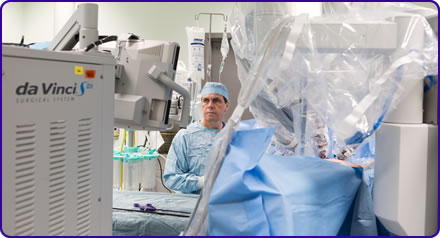
Prostate cancers range from very aggressive tumours to slow growing tumours. Slow growing tumours are more common and may not cause any symptoms or shorten life.
Early prostate cancer usually causes no symptoms. Often it is diagnosed during the workup for an elevated PSA noticed during a routine checkup. Prostate cancer is associated with urinary dysfunction as the prostate gland surrounds the prostatic urethra. Changes within the gland, therefore, directly affect urinary function.
Advanced prostate cancer can spread to other parts of the body, possibly causing additional symptoms. The most common symptom is bone pain, often in the bones of the spine, pelvis, or ribs.
Prostate Cancer Treatment
At the Bristol Urological Institute we have some of the most experienced prostate cancer specialists in the country, with a strong research portfolio collaborating with The University of Bristol and The University of the West of England. We work very closely with our oncology colleagues and a team of specialist nurses to provide the most appropriate and up to date treatment for each individual patient.
There are a variety of treatment options and all these options and their suitability for you as an individual can be discussed with your surgeon:
Low-dose rate and high-dose rate brachytherapy
External beam radiotherapy
Active surveillance
High-intensity frequency ultrasound
Robotic Assisted Laparoscopic Prostatectomy
Robotic assisted laparoscopic prostatectomy (RALP) is a minimally invasive, surgical procedure that removes the cancerous prostate gland and related structures. Here at the Bristol Urological Institute we have some of the highest-volume cancer surgeons in the country, many of whom are international teachers for robotic surgery. To perform the operation to remove your prostate your surgeon will be using the Da Vinci surgical robot. This allows the surgeon to perform a keyhole (laparoscopic) operation with improved 3D vision and with finer instrument dexterity.
The Robot is connected to the patient using six small incisions in the abdomen, which the instruments pass through. The surgeon controls the robotic instruments from a separate “console” and is able to perform very precise surgery to remove the prostate but carefully protect the surrounding structures. This type of surgery allows for faster recovery, less pain, earlier discharge and a quicker return to normal daily activities.
